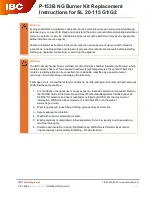
10
3 General requirements
Instructions for installation and servicing ecoMAX
10
The flue assembly shall be so placed or sheilded as to
prevent ignition or damage to any pary of the building.
Terminal position
mm
A
Directly below an opening, above an opening or
horizontal to an opening, air brick, opening window, etc. 300
B
Below gutters, soil pipes or drain pipes
75
C
Below eaves
200
D
Below balconies
200
E
From vertical drain pipes and soil pipes
25
F
From internal or external corners
300
G
Above ground, roof or balcony
300
H
From a surface facing a terminal
600
I
From a terminal facing a terminal
1200
K
Vertically from a terminal on the same wall
1500
L
Horizontally from a terminal on the same wall
300
M
Distance from adjacent for vertical Flue
500
Table 3.2 Terminal position for a fan assisted concentric flue
Note!
In addition, the terminal should not be nearer
than 150 mm to an opening in the building fabric
formed for the purpose of accommodating a
built–in element such as a window.
BS 5440–1 It is recommended that the fanned flue termi-
nal should be positioned as follows:
a) at least 2m from an opening in the building directly
opposite, and
b) so that the products of combustion are not directly
directed to discharge across a boundary.
1) Dimensions B, C and D:
These clearances may be reduced to 25 mm without
affecting the performance of the boiler. In order to
ensure that the condensate plume does not affect
adjacent surfaces the terminal should be extended as
shown in fig. 3.8.
2) Dimension F:
This clearance may be reduced to 25 mm without
affecting the performance of the boiler. However, in
order to ensure that the condensate plume does not
affect adjacent surfaces a clearance of 300 mm is pre
ferred. For IE, recommendations are given in the cur-
rent edition of IS 813.
Fig. 3.5
3.8 Air supply
Detailed recommendations for air supply are given in
BS 5440: Part 2.
It is not necessary to have an air vent in the room or
internal space in which the boiler is installed.
3.8.1 Cupboard or compartment ventilation
The boilers are very high efficiency appliances. As a con-
sequence the heat loss from the appliance casing during
operation is very low. Compartment ventilation is requi-
red if the flue used in not concentric and air is supplied
from the room or compartment the boiler is installed in.
3.9 Electrical supply
A 230 V, ~ 50 Hz single phase electricity supply fused to
3 Amp. must be provided in accordance with the latest
edition of BS7671 (IEE Wiring Regulations) and any other
local regulations that may apply. In IE reference should
be made to the current edition of the ETCI rules. The
method of connection to the mains electricity supply must
provide a means of completely isolating the boiler and
its ancillary controls. Isolation is preferably by the use of
a fused three pin plug and unswitched shuttered socket
outlet, both complying with the requirements of BS 1363.
Alternatively, a 3 Amp. fused doublepole switch with a 3
mm contact separation on both poles may be used.
This appliance must be earthed.
3.10 Guide to system requirements
3.10.1 Water circulation system
Detailed recommendations for the water circulation
system are given in BS 6798 and BS 5449: Part 1 (for
small bore and micro bore central heating systems).
Pipework not forming part of the useful heating surface
should be insulated to help prevent heat loss and possi-
ble freezing, particularly where pipes are run through
roof spaces and ventilated underfloor spaces. Draining
taps must be located in accessible positions which per-
mit the draining of the whole system including the boiler
and the hot water system. Draining taps should be at
least 1/2 in. BSP nominal size and be in accordance with
BS 2879. The boiler is suitable for use with minibore or
microbore systems. Copper tubing to BS 2871: Part 1
should be used for water carrying pipework. All capillary
joints in all DHW pipework must be made with lead free
solder. Particularly where a new boiler is to be fitted to
an existing system, it is good practice that the system is
thoroughly cleansed.
Attention!
To prevent the formation of deposits and pre-
vent serious damage to the appliance and
system , cleansers must be used carefully and
must be completely removed by thoroughly
flushing the system. Cleansers should only be
left in systems for a maximum of 24 hours.
balcony/eaves
flue extended to
clear any overhang
flue adequately
supported
gutter
80020014605_00GB_032006 22.02.2006 21:35 Uhr Seite 10
Summary of Contents for ecoMAX 635
Page 41: ......
Page 42: ......
Page 43: ......
Page 44: ...0020014605_00GB 03 2006 Subject to alteration...











































